-
Welcome back Guest! Did you know you can mentor other members here at H-M? If not, please check out our Relaunch of Hobby Machinist Mentoring Program!
You are using an out of date browser. It may not display this or other websites correctly.
You should upgrade or use an alternative browser.
You should upgrade or use an alternative browser.
What size screws do you stock up on?
- Thread starter Ken from ontario
- Start date
- Joined
- Dec 26, 2016
- Messages
- 2,106
Alright,the reason I ask about the size/type of screws is a bit deeper , but let's keep it simple so I understand.you see I know many of you design and fabricate parts/ tools etc , so when you design some part from scratch , how do you determine what type of screw to use, or whether to use socket , button or flat head cap screws(or any other type of screws), I can imagine how the length is determined but what formula do you use for the thickness and type of the screw? or how many screws, what the location ? corners ? center? both?
I do understand bolt come in variety of strength, and are used based on the amount of stress they would be under but could you use more weaker screws opposed to a few but more heavy duty ones? i.e, 10 pcs of 1/4"-20 opposed to 4 X 3/8"-16?
I ask because right now I use what I have in stock but I'm a hobbyist, how do the pros choose their screws?
I do understand bolt come in variety of strength, and are used based on the amount of stress they would be under but could you use more weaker screws opposed to a few but more heavy duty ones? i.e, 10 pcs of 1/4"-20 opposed to 4 X 3/8"-16?
I ask because right now I use what I have in stock but I'm a hobbyist, how do the pros choose their screws?
4
4GSR
Forum Guest
Register Today
Most of them buy them by the box full or by the pound as they need them or as the job calls for. The left overs go to the big bin to dig thru when you are looking for one or two of a given size. Not many keep assortments of assorted sizes to have on hand.......................
I ask because right now I use what I have in stock but I'm a hobbyist, how do the pros choose their screws?
I've made or bought assortment boxes for most sizes up to 5/8" Anything bigger than that is bought as needed. I do have left overs in sizes up to 1". Flat heads, hex heads, I buy them as needed, even though I've built up a good stock of sizes of them over the years.
- Joined
- Jul 2, 2014
- Messages
- 7,594
I tend to base my designs on what I have on hand. If what I have does not make sense for the job, then I buy what I think is best for it. I have lots of coffee cans full of sorted misc. fasteners, cutoffs, and other leftovers, so I can almost always get by with what I have. I also buy lots of fasteners for cheap at yard, garage, estate, and other sales. They are often about 10 pounds for a dollar, when you can find them, and no trip to the store or waiting for mail order... Disclaimer, I am not a pro, not by a long shot. I am a hobby machinist.Alright,the reason I ask about the size/type of screws is a bit deeper , but let's keep it simple so I understand.you see I know many of you design and fabricate parts/ tools etc , so when you design some part from scratch , how do you determine what type of screw to use, or whether to use socket , button or flat head cap screws(or any other type of screws), I can imagine how the length is determined but what formula do you use for the thickness and type of the screw? or how many screws, what the location ? corners ? center? both?
I do understand bolt come in variety of strength, and are used based on the amount of stress they would be under but could you use more weaker screws opposed to a few but more heavy duty ones? i.e, 10 pcs of 1/4"-20 opposed to 4 X 3/8"-16?
I ask because right now I use what I have in stock but I'm a hobbyist, how do the pros choose their screws?
- Joined
- Dec 26, 2016
- Messages
- 2,106
Thanks Ken, thank you all for your comments so far.Most of them buy them by the box full or by the pound as they need them or as the job calls for. The left overs go to the big bin to dig thru when you are looking for one or two of a given size. Not many keep assortments of assorted sizes to have on hand.
I've made or bought assortment boxes for most sizes up to 5/8" Anything bigger than that is bought as needed. I do have left overs in sizes up to 1". Flat heads, hex heads, I buy them as needed, even though I've built up a good stock of sizes of them over the years.
I like the assortment boxes idea, the thing is, I don't have many screws left to finish any project and need to start a small collection of some screws, I also try my best to stay away from cheap screws that strip/snap under normal use so the assortment boxes available here may not be such good bargain, I have used the imported HoloKrome and have been happy with them so far but the no name brands, I'm not sure..
- Joined
- Mar 3, 2014
- Messages
- 634
I watch for any screws and bolts that can be had cheep. Not cheep stock but purchased on the cheep.
When I have to pay full price I will get extras if they are a very useful size or not expensive.
But I do live in a remote area and anything purchased locally is very expensive.
I use what I have on hand whenever possible but try to use a fastener appropriate for the job.
When I have to pay full price I will get extras if they are a very useful size or not expensive.
But I do live in a remote area and anything purchased locally is very expensive.
I use what I have on hand whenever possible but try to use a fastener appropriate for the job.
- Joined
- Oct 31, 2014
- Messages
- 444
I'm not a pro, I'm a software/firmware person who makes prototypes and limited run pre-production stuff. And this is not a list of what I use, it is a cautionary tale.
First of all and most importantly, DO NOT DO AS I DO!
For a long time whenever I needed hardware bits I'd buy a 100-piece box of whatever it was (6-32 x 0.5" PHP machine screws f''r instance) and ensconce it into its own little drawer. Sometimes the bulk of the screws or whatever was more than a drawer would hold so I put the remainder into a backup storage location.
Of course, after a while the little 'working' drawer emptied and I forgot that I had the backup remainder stashed away - and bought another box of whatever it was and repeated the process. So now I had two partial packages of excess hardware parts secreted away. And the process repeated. Again and again.
It worsened even more when I was at my hardware supplier's place and couldn't remember for sure what I had on hand and what I needed - and of course there was always something on sale or closeout - so the hardware assortment grew a bit more.
And worsened a bit more when I got 'orphan' screws, nuts and bolts. I didn't want to mix slotted and Phillips screws, so each got a drawer. And 'regular' hex nuts and Kep nuts.
And I also did the math and realized that 1,000 of a part at my supplier cost less than ten boxes of 100. So I started buying by the thousand.
Which wouldn't have been so bad if I had a system to remember what I had lots of and what I was almost out of. I didn't have a system. But I did have a lot of screws. And nuts. And washers. And lockwashers - internal, external and split. Plus the Kep Nuts. eek!
It is a terrible addiction. Do not go that way, yonder lurks hardware madness.
If you are starting out, buy a box of 100 of what you need, give it a logical home in a drawer and label the drawer. They are cheaper by the 100 and small stuff is pretty inexpensive and you will build up a useful supply. Keep related parts together - 6-32 with 6-32, 1/4"-20 with 1/4"-20. Resist the urge to allow opposites to attract. Put the remainder in a labeled container - bag, box, jar, and make a list of what you have and where it is. Post the list on the wall. Pick a nice big spot to put your overflow parts and label it clearly. When you think you have run out of a part because the 'working' drawer is nearing empty - check your list and see if you bought extras - or just check your backup stock FIRST before buying more.
I wish I had done that 30 years ago. I would not now have multiple drawers of the same part scattered around my rather smallish shop area. When I get some spare time I am going to organize my nuts and bolts. Or maybe just go nuts - that seems easier at this point.
Stu.
Photos are some of my 'working' drawers, plus some 'spares' and some of the 'backup' stock. Yikes!
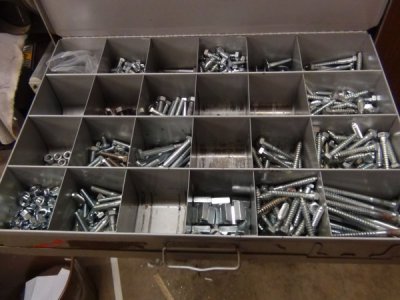
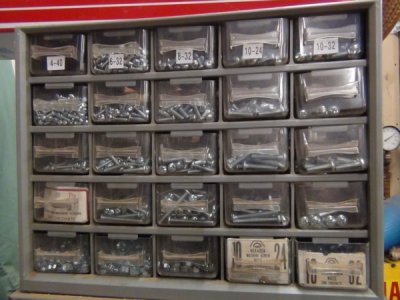
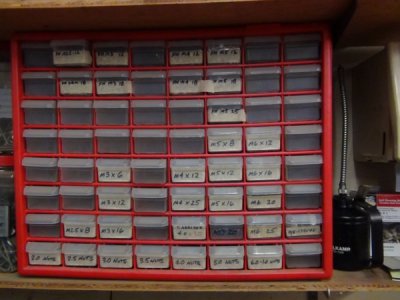
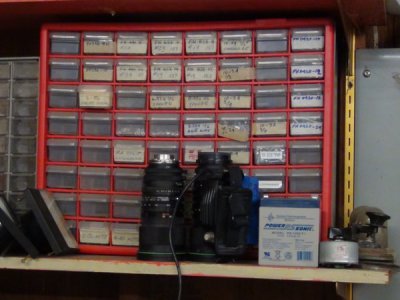
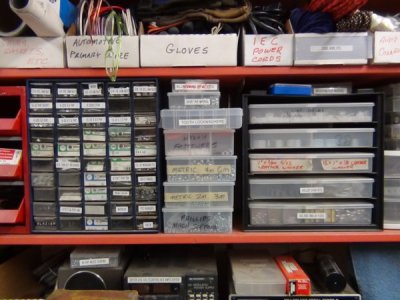
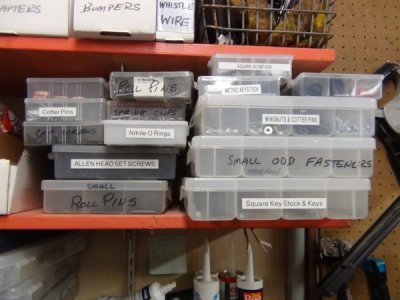
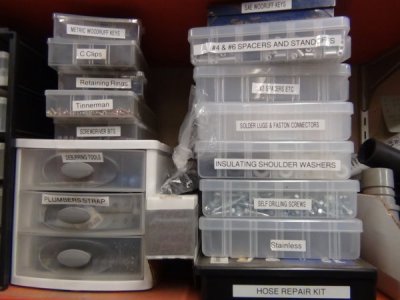
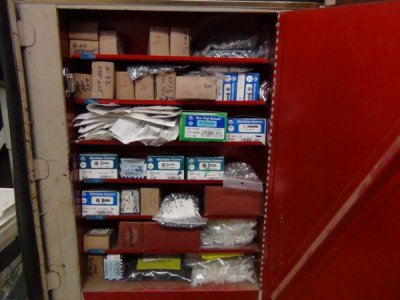
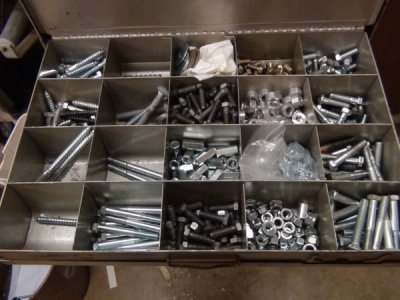
First of all and most importantly, DO NOT DO AS I DO!
For a long time whenever I needed hardware bits I'd buy a 100-piece box of whatever it was (6-32 x 0.5" PHP machine screws f''r instance) and ensconce it into its own little drawer. Sometimes the bulk of the screws or whatever was more than a drawer would hold so I put the remainder into a backup storage location.
Of course, after a while the little 'working' drawer emptied and I forgot that I had the backup remainder stashed away - and bought another box of whatever it was and repeated the process. So now I had two partial packages of excess hardware parts secreted away. And the process repeated. Again and again.
It worsened even more when I was at my hardware supplier's place and couldn't remember for sure what I had on hand and what I needed - and of course there was always something on sale or closeout - so the hardware assortment grew a bit more.
And worsened a bit more when I got 'orphan' screws, nuts and bolts. I didn't want to mix slotted and Phillips screws, so each got a drawer. And 'regular' hex nuts and Kep nuts.
And I also did the math and realized that 1,000 of a part at my supplier cost less than ten boxes of 100. So I started buying by the thousand.
Which wouldn't have been so bad if I had a system to remember what I had lots of and what I was almost out of. I didn't have a system. But I did have a lot of screws. And nuts. And washers. And lockwashers - internal, external and split. Plus the Kep Nuts. eek!
It is a terrible addiction. Do not go that way, yonder lurks hardware madness.
If you are starting out, buy a box of 100 of what you need, give it a logical home in a drawer and label the drawer. They are cheaper by the 100 and small stuff is pretty inexpensive and you will build up a useful supply. Keep related parts together - 6-32 with 6-32, 1/4"-20 with 1/4"-20. Resist the urge to allow opposites to attract. Put the remainder in a labeled container - bag, box, jar, and make a list of what you have and where it is. Post the list on the wall. Pick a nice big spot to put your overflow parts and label it clearly. When you think you have run out of a part because the 'working' drawer is nearing empty - check your list and see if you bought extras - or just check your backup stock FIRST before buying more.
I wish I had done that 30 years ago. I would not now have multiple drawers of the same part scattered around my rather smallish shop area. When I get some spare time I am going to organize my nuts and bolts. Or maybe just go nuts - that seems easier at this point.
Stu.
Photos are some of my 'working' drawers, plus some 'spares' and some of the 'backup' stock. Yikes!









- Joined
- Feb 8, 2014
- Messages
- 11,176
how do you determine what type of screw to use, or whether to use socket , button or flat head cap screws(or any other type of screws)
I use socket heads when I want to counterbore to have the head flush with the surface, many times for appearance, but sometimes for clearance. Flat heads get used if flush heads are required for clearance or to just clean up the lines of the part and lateral location is needed. Button heads get used for appearance or where a little larger head is needed for spreading out the load on the compressed surface, also work well for attaching sheet metal pieces (guarding for instance) to an assembly where you have extra large holes in the sheet metal for ease of installation.
what formula do you use for the thickness and type of the screw?
I don't really try to engineer the loads in most cases. Many times the screw diameter is dictated by existing mount holes in whatever you are attaching or attaching to. Much of the determination is done just drawing on experience, and partly what you have on the shelf. Just being around machinery for many years gives you a pretty good idea of what works and common engineering practices.
As far as screw positioning on an assembly, do you use 2, 4, 6 or more? That is sometimes a tough question. It's really a matter of partly appearance, and partly function. Sometimes 2 would do, but you use 3 or 4 anyway because it looks better and more symmetrical. For instance, if you have a square part that you are attaching, you would want a screw in each corner, just because.
I hope this kinda answers some of your questions.
I have a hardware store 3 minutes away that has an excellent supply of bolts nuts and screws so I try not to stock any just buy what I need plus some extras I mostly buy stainless as things in my shop rust rapidly stainless doesn't rust. bill
- Joined
- Feb 7, 2013
- Messages
- 2,529
I have collected and saved hardware from disassembly of machinery and electronic equipment. For small hardware I have labeled
bins for nuts, bolts, washers, My larger bolt collection is less organized and is kept in several trays that one can paw
through to find the needed hardware. I do keep washers and nuts in large jars so they are somewhat organized. I have
other containers for sheet metal screws and Torx wood screws and lag screws. Basically I know what I have and where
it is. Occasionally I will have a specific need requiring a trip to the hardware store but not very often. Some of my bolts are rusty.
It's amazing how well they clean up on a wire wheel(diamonds in the ruff).
View media item 94595
This is an old photo and the wire wheel now has a guard on it for my protection.
bins for nuts, bolts, washers, My larger bolt collection is less organized and is kept in several trays that one can paw
through to find the needed hardware. I do keep washers and nuts in large jars so they are somewhat organized. I have
other containers for sheet metal screws and Torx wood screws and lag screws. Basically I know what I have and where
it is. Occasionally I will have a specific need requiring a trip to the hardware store but not very often. Some of my bolts are rusty.
It's amazing how well they clean up on a wire wheel(diamonds in the ruff).
View media item 94595
This is an old photo and the wire wheel now has a guard on it for my protection.
